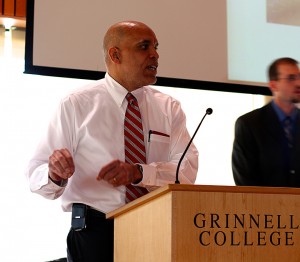The Office of Institutional Planning held two town hall meetings to discuss renovating the Forum last Tuesday, April 12.
Ames-based architectural group RDG Planning presented both the problems with the Forum and their renovation solution. Since the construction of the new student union, The Joe Rosenfeld Center (JRC), in 2007, the Forum is struggling to find a new niche.

“We started thinking very hard about how we could reassign the function of the Forum,” said Marci Sortor, Vice President of Institutional Planning and Professor of History. “At that point we started exploring issues of what were the functions that could go in there.”
An early example of the architectural style known as field theory, the building was completed in 1963 and was designed with eight separate levels. However, the steep stairs separating these levels, among numerous other stylistic features, create accessibility and safety problems. In an attempt to make the building more accessible, the ramps on the west side were added on after the building’s completion, but it still doesn’t meet modern safety or handicapped accessibility standards.
Sortor sees this as the main problem with the Forum.
“Right now, for example, we’re frustrated because we can get people into some spaces but you can’t move about within the building,” Sortor said. “Or if you’re visiting South Lounge for any event, maybe you can get in if someone helps you, but if you have to use a restroom, you have to go outside, go around the back of building and then do the same thing [to get back].”
Sarah Kay ’13, who frequently uses the Creative Computing Lab in the Forum for the campus group Press and her classes, said that the Forum’s outdated architecture distracts from the high-end resources within it.
“I’m not a big fan of how the building looks,” Kay said, “I don’t think it serves a very utilitarian function … [but] it is a nice bridge between student housing and the academic buildings.”
The RDG renovation plan would consolidate the eight separate floors into three, redesign the west side entrance to make it accessible, and add two elevators. The total cost to modernize the structure would be approximately $9.1 million. Preserving the Forum’s purpose on campus dominated the discussion at the town hall meeting. Although the JRC replaced the Forum as the social center on campus, many hope it can retain its intellectual reputation. As one commenter at the town hall said, “It was never meant to be a conventional student union, … [or] a place for students to leave their intellectual hats at the door.”
Kay believes that the Forum can regain some of its social status.
“Maybe making it more of a place where people can come and hang out, sit down and have group meetings,” Kay said. “Right now it’s not that; more people are here to get work done or go to the Helpdesk, or the Health Center or Forum South and that’s it. More of a communal place would be really nice.”
Sortor believes that the building’s history, coupled with the campus’ accessibility needs, will guide its future.
“The forum figures importantly in some people’s personal history and relationship to the College, and for the people who are interested in the architecture, it is an interesting building,” Sortor said. “We also have people who feel very strongly that it should go away.—in particular, people who have trouble with mobility or know people who have trouble with mobility. They absolutely cannot stand it.”
More importantly, Sortor says that the Grinnell community needs to reevaluate the Forum’s use.
“If we think about the campus plan … what do we want to accomplish on the campus in terms of teaching and learning,” Sortor said. “At that point you start thinking about your available space and the buildings and whether they’re serving the overall campus needs best … in conjunction with what else might be in that space and how well could it serve our purposes.”
At the town hall, however, the administration discussed three options for the building. It could be demolished and rebuilt, renovated or remain untouched as an historical artifact. Over the next few months there will be several discussions among the administration and trustees regarding the future of the Forum. According to President Raynard Kington, who spoke at the town hall, there will probably be a decision at the end of next year.






















































